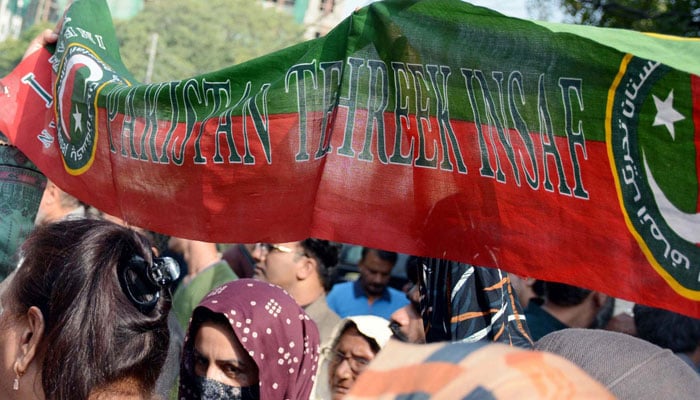PTI reserved seats verdict: No basis for review, Justice Ayesha, Justice Aqeel say in dissenting notes
13-member constitutional bench on May 6 admitted for regular hearing review petitions filed by ECP
ISLAMABAD: Justice Ayesha A Malik and Justice Aqeel Ahmed Abbasi, in their joint dissenting note in the reserved seats case, declared that no ground for review is made out as all issues raised have been sufficiently dealt with in the detailed judgement.
The two judges released their joint dissenting note in the review petitions against July 12 verdict of the apex court that had held that Pakistan Tehreek-e-Insaf (PTI) was entitled to get reserved seats for women and minorities in the National and Provincial Assembly.
A 13-member constitutional bench, headed by Justice Aminuddin Khan, on May 6 admitted for regular hearing the review petitions, filed by the Election Commission of Pakistan (ECP) and PMLN and Pakistan Peoples Party Parliamentarians (PPPP) against the July 12, 2024 verdict in reserved seats case.
In their dissenting notes, Justice Ayesha and Justice Aqeel Abbasi noted that the focus of the counsel had been on the issue that the PTI was not before the court, the procedural steps for impleading the PTI as a party to the proceedings and granting of relief.
The detailed judgement not only addressed those issues in great detail but more importantly, also addressed the larger constitutional question being the protection of the right of electorate as guaranteed under the Constitution, the two judges held.
They further held that the petitioners attempted to reargue the case in order to obtain a different opinion from the one given, adding that the court had time and again held that review jurisdiction had limited scope and parties could not reargue their case in that jurisdiction.
“This court has also held that even where there is some material irregularity but no substantial injury is caused then the judgment cannot be reviewed,” the two judges held, adding that the court emphasized time and again that every judgment announced by the Supreme Court was considered to be solemn, final and a conscious deliberated decision where the power of review could not be invoked as a routine matter and should be exercised in exceptional circumstances to avoid gross injustice.
Justice Ayesha and Justice Abbasi held that the instant petitions were an example of cases filed in review jurisdiction where no ground was made out and the focus was on rearguing the case.
They held that in the petitions before them, the PMLN and PPPP had not attributed any error to the detailed judgment as they had only challenged the short order in the review petitions.
They noted that as such, no objection has been raised to the underlying rationale or findings of the court in the detailed judgement and as a result, they have failed to point out any reviewable ground.
Referring to the ECP revision petition, the two judges held that the commission, by way of its challenge to the short order and the filing of the additional grounds, had basically attempted to reargue the case.
Justice Ayesha and Justice Aqeel held that the independence of the ECP was fundamental to the election process, which was the very foundation of democracy and that the ECP should not become subservient to political influences rather must remain an impartial custodian of democracy.
Both the judges held that by filing review petitions, the ECP has once again revealed its political interest so far as the allocation of reserved seats is concerned.
-
 First Poll Since King Charles' Action Against Andrew Reveals Royal Family's Public Standing
First Poll Since King Charles' Action Against Andrew Reveals Royal Family's Public Standing -
 Blake Lively Strengthens Legal Team Ahead Of Justin Baldoni Trial
Blake Lively Strengthens Legal Team Ahead Of Justin Baldoni Trial -
 'Back To School!': Palace Shares Details Of Princess Anne's Latest Engagements
'Back To School!': Palace Shares Details Of Princess Anne's Latest Engagements -
 Paul Mescal Clarifies Acting Break Comment As He Teases Paul McCartney Role
Paul Mescal Clarifies Acting Break Comment As He Teases Paul McCartney Role -
 Kate Middleton's Unexpected Style Of Arrival At Solo Outing Goes Viral
Kate Middleton's Unexpected Style Of Arrival At Solo Outing Goes Viral -
 Why ‘X’ Is Down? Thousands Report Twitter Outage: Here’s What You Can Do
Why ‘X’ Is Down? Thousands Report Twitter Outage: Here’s What You Can Do -
 Florida Man Held After Alleged Nail-scattering On Busy Intersections
Florida Man Held After Alleged Nail-scattering On Busy Intersections -
 Valeria Nicov: Sean Penn's Athletic Girlfriend Raises Eyebrows With Latest Photos
Valeria Nicov: Sean Penn's Athletic Girlfriend Raises Eyebrows With Latest Photos -
 Sharon Stone Lashes Out At Fellow Award Show Attendees After Stealing Accusations
Sharon Stone Lashes Out At Fellow Award Show Attendees After Stealing Accusations -
 Gwyneth Paltrow Reveals Real Reason She Said Yes To 'Marty Supreme'
Gwyneth Paltrow Reveals Real Reason She Said Yes To 'Marty Supreme' -
 King Charles Says He And Queen Camilla Stand With People Of Ukraine
King Charles Says He And Queen Camilla Stand With People Of Ukraine -
 Ben Affleck Argues In Favour Of His Shirtless Scene In 'The Rip'
Ben Affleck Argues In Favour Of His Shirtless Scene In 'The Rip' -
 Mississippi Postal Worker Arrested After Complaints Of Marijuana Odour In Letters
Mississippi Postal Worker Arrested After Complaints Of Marijuana Odour In Letters -
 Canada, China Lock Initial Trade Deal On ‘EV,Canola’ To Strengthen Ties: What To Expect Next?
Canada, China Lock Initial Trade Deal On ‘EV,Canola’ To Strengthen Ties: What To Expect Next? -
 Melissa Leo On Euphoria Of Winning An Oscar Vs It's Impact On Career
Melissa Leo On Euphoria Of Winning An Oscar Vs It's Impact On Career -
 Meghan Markle, Prince Harry Express 'hope' In Latest Major Statement
Meghan Markle, Prince Harry Express 'hope' In Latest Major Statement




